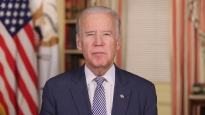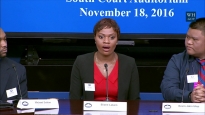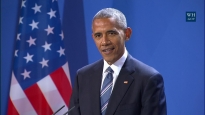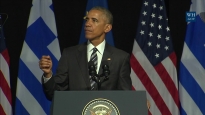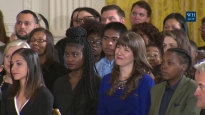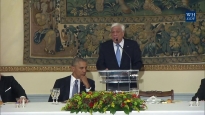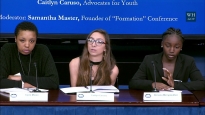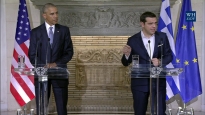Press Briefing
May 14, 2014 | 42:59 | Public Domain
White House Press Briefings are conducted most weekdays from the James S. Brady Press Briefing Room in the West Wing.
Press Briefing by Press Secretary Jay Carney, 5/14/14
James S. Brady Press Briefing Room
See below for a follow up to a question (marked with an asterisk) posed in the briefing.
*Higher education has never been more important, and it should be affordable for everyone who is willing to work for it, not a luxury for the few. We appreciate the efforts of Democrats on the Hill to make college more affordable and agree that Americans who are working hard to pay back their student loans should be able to refinance at lower rates.
11:52 A.M. EDT
MR. CARNEY: Good morning, everyone. Thanks for being here. Or maybe that explains the empty seats. This might be early for some journalists.
Q Well, well. (Laughter.)
MR. CARNEY: I didn’t mean it that way, but the adjustment I had to make from my previous life -- this doesn’t apply to those of you who do morning TV, which I know is brutal -- is that I definitely had to reorient my daily clock.
Before I get started, I wanted to say a couple of things. First of all, there's a very important birthday today, and that is Connie Lawn is celebrating. And Connie has been doing this for a long time, and doing it well. And on behalf of myself and the press office, we have some cupcakes for Connie.
Q Thank you so much. (Applause.)
MR. CARNEY: I’d also like to mention, if I might, another milestone that’s being reached later this week, and that is the retirement of Barbara Walters. I was emailing with a colleague of hers who told me that she has interviewed every President and First Lady since Richard Nixon, been on television for more than five decades, and claims she’s retiring on Friday. I don’t believe it. I expect we’ll be getting an interview request within weeks. But given that, at least officially, Barbara Walters is retiring and she’s an institution, I’d like to offer her the congratulations of everyone here at the White House, including President Obama and the First Lady.
One more item, on a much more somber note -- it’s a statement from me that you’ll be receiving in your inboxes about the Turkish mining collapse.
Our thoughts and prayers are with the people of Turkey today in the wake of a coal mine explosion in Soma in which some 200 have been killed and hundreds more remain trapped. On behalf of the American people, we extend our heartfelt condolences to the families of the victims, and our best wishes for the safe exit of the remaining miners. Turkey is a close and longstanding friend and ally of the United States. We are ready to assist the Turkish government if necessary, and we will continue to stand together in this time of tragedy.
Now I’m ready for your questions. Nedra.
Q Jay, on that point, there are some protests there -- people are really angry at the government. And I wonder if part of the assistance that the United States wants to provide is better mine safety. Have you talked to them about that over there?
MR. CARNEY: I am not aware of conversations of that nature at this point, given how recent the tragedy was and the fact that there are still miners that are trapped. The State Department may have more on the kinds of conversations and the kinds of assistance that we might be offering -- the kinds of conversations we might be having and the assistance we might be offering. But at this point, I don’t have anything more.
Q And in Ukraine, the government is holding talks as part of the OSCE process. They don’t include the separatists. Should they be included in this to make some progress?
MR. CARNEY: Well, we commend the Ukrainian government on their efforts to hold roundtables, beginning today, on constitutional reform and national unity facilitated by the OSCE -- including with Ukrainians from the eastern and southern regions. And we call on Russia to support this effort.
Now, we understand, certainly, the unwillingness of the Ukrainian government to have participants in these roundtables who literally have blood on their hands. But those who represent the regions where there are issues that merit serious dialogue around constitutional reform and levels of autonomy for different regions as it relates to the center are certainly part of this effort, and we commend it.
Q On another domestic issue -- does the White House support Private Chelsea Manning’s request to be transferred to a civilian prison so that she can live as a woman?
MR. CARNEY: That’s not a conversation I think that takes place here. I have not heard anyone discuss that here.
Yes.
Q Jay, thanks. Tensions are rising in the Southeast Asia region over China’s construction of a drilling rig in the South China Sea area. That’s something that the President sought to address in his trip. Is there anything the United States can do to diffuse tensions there?
MR. CARNEY: Well, we’ve made our views clear, most recently and publicly in the various instances during the President’s trip to Asia where he was asked about these tensions and addressed these matters. And our view has always been that these are disputes that need to be resolved through dialogue, not through intimidation. And we are not party to the specific disputes, but we again urge dialogue in their resolution, and that would apply in this case.
Q On a domestic issue -- the President tomorrow is visiting the ceremonial opening of the memorial museum for September 11th. This is obviously a deep wound in the American psyche, a relatively recent event. What, without asking you to talk about exactly what he’s going to say tomorrow, what does the President hope to achieve or communicate to the American people with this visit?
MR. CARNEY: Well, I think you spoke to it in your question. 9/11 is an event that I think every American who’s old enough to remember the day remembers with searing clarity. And we lost a lot of Americans on that day, that horrible day. We also saw extraordinary feats of heroism and selflessness on that day. And we as a nation, and New York as a city, demonstrated a capacity for resilience and unity that I think made everyone proud here and was noticed around the world -- including by those who sought and seek to do Americans harm.
So I think the President and First Lady look forward to this event, are especially mindful in their positions, but also as citizens, about the need to remember and the power of memory in a nation’s history, as well as the need to properly grieve and rebuild and move forward.
Q And if I could just get back to a much more mundane matter, Democrats in Congress are introducing legislation making a push for refinancing student loans at lower rates. Has the White House expressed support for this measure? Can you tell us where you stand on that?
MR. CARNEY: I don’t have a position at this point on that to provide to you. I’ll have to take the question, and we’ll get back to you on it.*
Jim.
Q Jay, getting back to the 9/11 Memorial Museum and its ceremonial opening tomorrow morning -- Mayor de Blasio in New York City has called for federal funding of that museum, saying that there is no federal funding for that museum at this point; that it exists and it’s going to operate basically through the admission fees that people pay to visit that site. Is that something that the White House would consider?
MR. CARNEY: I haven’t heard discussion of that request or that observation by the mayor. I think tomorrow the President and the First Lady will be focused on the opening of the museum and all that it means to the people of New York, the people of the country. So I just don’t have a view of the White House to express on that point.
Q And jumping to the Nigerian girls, Senator McCain, as I’m sure you saw, is making a call for special forces to be used -- U.S. special forces to be used to rescue those girls. What’s the White House take on that today? Is that something that might be examined as we get closer to finding them?
MR. CARNEY: Well, I think -- two points. First, let’s not get ahead of ourselves. We are actively advising, including through military personnel, the Nigerian government as it seeks to find, to locate and to rescue these girls. Finding them is the first step. Our military personnel at the embassy, and any additional military personnel we may deploy, will be in Nigeria in an advisory capacity. And at this point, we’ve not actively considering the deployment of U.S. forces to participate in a combined rescue mission.
And again, I think it’s important to be mindful of where we are in this process and not get ahead of ourselves. We’re engaged at many levels now as part of this group that’s been stood up at the embassy with personnel from the embassy as well as from AFRICOM and elsewhere, including military, state and FBI, to assist the government in the effort underway to find the kidnapped girls. That effort includes manned fixed-wing reconnaissance flights. It also includes now unmanned reconnaissance -- unmanned, unarmed reconnaissance flights in the effort to find them.
And I would note that even the narrowly drawn area where there is the greatest suspicion that the girls might be is an area that is something along the size of West Virginia, the state of West Virginia. So this is a pretty vast expanse of territory.
Q And it could get complicated if they’ve been broken apart and split up.
MR. CARNEY: Well, there’s no question -- we don’t have intelligence to share about the location of the girls or whether they’re all together. But the time is of the essence, as we’ve been saying. That’s why we were so eager to assist the Nigerian government in this effort that the Nigerian government, of course, is leading.
But it’s important to note to step back and understand the challenges that this search effort is facing.
Q And I know it’s difficult to respond to tweets and news that’s just broken in the last several minutes and so forth and so on, but just before you came out, Bill Clinton, at an event this morning, said that -- he said several things, but one thing he said about the Affordable Care Act is that perhaps a “long-term repair process” would be needed over the coming years; that Democrats shouldn’t run away from it, they should talk about it, not be afraid to talk about it, but that they should also say a long-term repair process is needed. What do you make of that?
MR. CARNEY: I didn’t see that particular tweet, but I think what former President Clinton is reflecting is a view held here at the White House and among Democrats -- and among the majority of the American people -- which is that we need to move forward with implementation of the Affordable Care Act and improve it where improvements are necessary; that there is no program of this scope in American history that has not required adjustments along the way. And we have, as you know, instituted adjustments and fixes when necessary in this early stage of implementation, and that is absolutely the right approach to take.
Unfortunately, we have seen in the now more than 50 efforts by Republicans on Capitol Hill to repeal, in essence, the Affordable Care Act, an interest in re-litigating those battles against the will of the majority of the American people instead of focusing on how we can make even better a system that allows for access to private insurance for millions and millions of Americans who need it -- private, quality, affordable health insurance. So that’s certainly a perspective that we share.
Yes, Mary.
Q Getting back to Jim’s question about funding for the 9/11 Memorial Museum -- many of the victims’ families have objected to the entrance fee, which I believe is $24. Does the President believe those objections are justified? Should families be required to --
MR. CARNEY: I just haven’t spoken to him about that, and I don’t have any eyes into the debate, if you will, about the funding for the museum. Right now, I think the President and the First Lady look forward to the opening of it and what it means for the city and the American people.
I’m not saying that those questions and debates and concerns aren’t valid, but at this point the President and First Lady will be focused on the memorial itself -- not the memorial, but the museum itself and the events that it will provide an opportunity for so many people to recall because of the significance of that moment and its aftermath to our history and to so many people around the world.
Major.
Q On the veterans question -- it seems to be really gaining a lot of momentum on the Hill; questions are being raised not just about Phoenix. On our broadcast last night, Wyatt Andrews talked about a secret wait list in Chicago where it would mask the wait lists for those seeking care. Both Republican and Democratic senators in Missouri are now asking the same questions of St. Louis. You said before that Veterans Secretary Shinseki has the President’s confidence. Two questions: Why does he retain the President’s confidence? And does the confidence stem from an analysis the President has made that the VA bureaucracy is simply too impenetrable for any secretary to get his or her arms around and that these problems are embedded, and Shinseki needs to stay on the job to fix them?
MR. CARNEY: Secretary Shinseki is a West Point graduate, decorated retired military officer who has worked diligently as VA Secretary to better serve our veterans, both now and in the future. He would be the first to tell you that there is more work to do.
The stress on the system that two additional wars -- long wars -- caused is something that the Secretary and the President recognize very keenly, and that’s why the President has insisted on increased funding for the VA throughout his time in office, even as we deal with the need for maintaining tight budgets as a general matter. It’s why we’ve enrolled at the VA under Secretary Shinseki’s leadership 2 million veterans in high-quality VA health care, reducing veterans’ homelessness by 24 percent, providing post-9/11 GI Bill educational benefits to more than 1 million students, and decreasing the disability claims backlog by 50 percent.
I know you were here the other day when the issue of the investigation in Phoenix and the lists for care were discussed within the context of the reduction in the disability claims backlog, and I wanted to make clear that these are two different issues, and it’s important to note that. And the specific investigation that’s underway is one that we have to allow to take place before we understand fully what happened there and what action needs to be taken. The Secretary has begun an investigation and made clear to the independent inspector general at VA that he would like to see a comprehensive review conducted of the situation in Phoenix.
Q Jay, on that comprehensive review, you have a Republican, Jeff Miller, who chairs the Veterans’ Committee, wrote a letter to the President I believe late yesterday saying he wants a bipartisan outside commission to investigate this. How can you trust that the VA IG and others can investigate this when it’s been going on we don’t know how long? Like, isn’t it clear that as these allegations pile up that maybe an outside panel needs to review it? Is that something the President will consider?
MR. CARNEY: Well, let me say a couple of things. Inspectors general are independent and are cited as such when -- should be cited as such because they are, and then sometimes they’re cited as such only when it is politically expedient for someone on Capitol Hill to do so. But the fact is inspectors general are by their constitutional makeup independent from the agencies that they oversee.
Secondly, I would say, about the letter itself, the White House has received the chairman’s letter and we are reviewing it, but at this point we don’t have any assessment to make about his suggestion or recommendation. But we are reviewing the letter.
Q But he says he wrote a letter a year ago to the President, and he says he got, “disturbing silence from the White House,” and “one excuse after another from the VA.” So what’s been done?
MR. CARNEY: Well, I mean, I can cite you what’s been done, including the increases in spending for VA services that this President has insisted on, often not always with --
Q So then why did 40 people in Phoenix die?
MR. CARNEY: Well, Ed, as you know, that’s under investigation, and we will assess what happened there when the facts are fully known. We take that situation and the allegations around it very seriously; the President does -- he’s made that clear himself, I’ve made it clear on his behalf, and certainly Secretary Shinseki has made it clear on his behalf and on the behalf of the VA.
So the fact of the matter is we are working aggressively to better serve our veterans, provide them more care, and to take care of them not just when it comes to their health needs but also through the GI -- Post-9/11 GI Educational Bill that has provided opportunities to returning vets from Iraq and Afghanistan through the efforts like Joining Forces that the First Lady and Dr. Biden have helped head up to make sure that the private sector is focused on the extraordinary talent pool that our veterans represent and that they are looking to veterans when they’re looking to fill positions. And this is a comprehensive effort to make sure that those who have sacrificed so much for all of us get the assistance and the service and the respect that they deserve.
Q Jay, you’re sort of talking around -- I mean, the central issue is the services veterans are receiving for care they’re seeking, and what we’re driving at is increased evidence that it’s not happening -- secret wait lists, the bonuses paid so people get things when the services aren’t being rendered. I know you would acknowledge --
MR. CARNEY: Major, I’m not going to quibble with you about allegations about one office and an allegation now about another. I would urge you to note how many Veterans’ Affairs offices there are around the country and simply state that what is required in circumstances like this is a clear-eyed, focused investigation and review, the likes of which are underway now.
And, again, we will look at the chairman’s letter and review it. I think we all share a concern, extreme concern when it comes to making sure that our veterans are getting the care they deserve. And when they’re not, and certainly when there’s -- if there’s inappropriate conduct involved in preventing them from getting care, the President and the Secretary will be the first to insist that action be taken.
Q In general, though, Democratic Senator Jon Tester today said on MSNBC that he thinks VA -- the VA Department is doing a “pretty darn good job.” Do you think overall they’re doing a “pretty darn good job?”
MR. CARNEY: Well, Ed, I’ll deliver the sound bite you’re looking for -- I think the VA has, under Secretary Shinseki, aggressively focused on the need to provide better care to our veterans, aggressively attacked the disability claims backlog that exists and was expanded before it came down by 50 percent because of the decision to make sure that those who had claims related to exposure to Agent Orange and those who had claims related to post-traumatic stress disorder were prejudged as likely to receive disability because of those claims. And that was the right thing to do. It also put added stress on the system and created an additional backlog, which the VA under Secretary Shinseki has been aggressively addressing.
Q One last topic. Can you address this report by the Center for Immigration Studies that claims that more than 36,000 illegal aliens who were criminals and were being processed for deportation were released by the administration? This report is claiming some of them were violent offenders; 200 of them had homicide convictions, close to 500 had sexual assault convictions.
MR. CARNEY: I haven’t seen the study or heard of it, Ed, so I’ll take the question. I think that our record on making sure that enforcement is focused on those who have committed crimes, felonies, is one that we’ve discussed quite a lot as it relates to deportations. But in terms of that specific document or study, I haven’t seen it so I don’t have a reaction.
Yes.
Q Jay, I want to go back to Jim’s question about sending special forces to Nigeria. You said that the administration is not actively considering sending special forces. Does that mean that that option is off the table completely?
MR. CARNEY: What I said is that we shouldn’t get ahead of ourselves. We are involved right now with the Nigerian government, advising the Nigerian government as they seek to find the girls so that they can be secured and returned to their families. So I would say at this point we’re not actively considering the deployment of U.S. military personnel in a combined rescue attempt. We would have to know where the girls are as a simple proposition before we could discuss rescue attempts.
At this point, we’re not considering, as I mentioned earlier, the deployment of U.S. military personnel. The military personnel who are involved in this effort are involved in an advisory capacity.
Q Understood. Senator McCain’s argument, just to flesh it out a little bit more, is that they should be in place so that once the girls are found -- whenever that should happen -- once their location is determined, those forces are at the ready. Is there some validity to that argument, or do you --
MR. CARNEY: I haven’t seen the specific comments. I mean, I’m aware that he talked about sending Special Forces personnel. I would say that, in terms of readiness of personnel, that’s a question better addressed to the Department of Defense.
Right now, we’re working with the Nigerian government on their efforts to find the girls, and if there’s a discussion about having found them, how to retrieve them, we’ll get to that discussion. But I’m not going to get ahead of the process right now that’s taking place in Nigeria. And I would point out, as I did earlier but I’ll emphasize it again, we’re talking in the narrowest terms about a search area that’s roughly the size of the state of West Virginia -- and that’s the narrow search area. Some estimates have placed the possible location of the girls in an even more vast expanse of territory. So this is not an easy piece of business that we’re talking about, and we’re focused right now in our assistance to the Nigerian government as they seek those girls.
Q I wanted to ask -- I guess there’s a new report today that France has in fact decided to move forward with selling warships to Russia. Secretary Hagel got a question about that just today; I know you were asked about it earlier. Can you update us? Can you confirm those reports? And has the U.S. spoken to France about that?
MR. CARNEY: We have, as I think I said yesterday, conveyed our concerns, but I have not seen information to suggest that they’ve made an announcement -- the French have made an announcement about a formal decision. So we’ve conveyed our concerns and will -- I’ll take the question or I’m sure we’ll get the question if there’s further development on it.
April.
Q Jay, I want to follow up on Kristen and about another subject. I want to get in the weeds a little bit about Nigeria. Is there an issue with the Nigerian government when it comes to the Nigerian girls? Because we’ve understood in the past that when African countries have issues and the United States or other countries come in, they like to say this is an African problem and you can assist. Is that some of the issue right here?
MR. CARNEY: I guess, April, what I would say is that, as would be the case in any country in a situation like this, Nigeria and the Nigerian government is leading the effort to search for these girls. And we are offering assistance -- specific, tangible assistance in personnel and materiel -- as part of our effort to advise them in that effort and assist them in that effort. And that is entirely appropriate. And I think it’s important to note that that includes the personnel I think I listed the other day as well as the assets that I talked about just in answer to Jim’s question -- fixed-wing aircraft, unmanned aerial vehicles -- part of the reconnaissance surveillance effort to search for the girls. And that’s what we’re focused on right now. We have personnel who are experienced in hostage negotiations, who are experienced in law enforcement aspects around matters like this, kidnappings, as well as in the reconnaissance effort. And we’re not the only country, obviously, assisting the Nigerians in this effort.
We noted early on as we started discussing this terrible situation in this briefing room that there isn’t time to waste here, and it is now more than 25 or 26 days I believe since the girls were kidnapped. And it’s certainly incumbent upon the Nigerian government, as well as those nations like the United States that are assisting the Nigerian government, to work overtime in the search for them.
Q It is clear when you have the United States and other countries who have -- who are much more equipped, better equipped with intelligence and security matters than Nigeria, why wouldn’t there be more of a presence from the world body than Nigeria -- Nigeria might take a backseat more so. Why is this still the case? Nigeria is leading this when the United States has more of a professional point of view when it comes to -- or a more engaged point of view when it comes to terrorism and al Qaeda and things of that nature than Nigeria has had. Why not let other world bodies come in and say, Nigeria, let us take care of this, sit back, we have more expertise in this? I mean, this has prolonged for this long because they’re doing it by themselves pretty much.
MR. CARNEY: Well, I guess I’d say a couple of things. Nigeria is a sovereign nation. The girls were abducted in Nigeria. They are Nigerian. And it’s entirely appropriate that Nigeria would lead the effort to find them.
What you talk about in terms of the unique capacities that the United States can bring to bear is absolutely true, and that’s why the assistance that we’re offering is of the nature that in many cases only the United States can offer or of the kind that the United States has the most experience or the best insight or the best equipment. And we’re actively engaged in deploying those resources on behalf of this search.
I also think -- and I think I was hoping to send that message when I was describing the scope of the search -- that it’s probably not the case that the United States or any other country with sophisticated means would have an easy time finding girls who had been kidnapped, individuals who had been kidnapped in an area as large as West Virginia or perhaps even larger. This is a big challenge no matter how you come at it. And that’s why it is involving so many nations and the assistance that they’re providing to the Nigerians.
Q And then lastly, on Brown v. Board, the anniversary is Saturday. Eric Holder will be speaking at Morgan State University on the actual anniversary. Could you talk to us about the significance of Brown v. Board, as this administration has been marking many of the civil rights landmark anniversaries?
MR. CARNEY: Well, sure. I don’t have any announcements to make in terms of how the anniversary is being marked here at the White House, but I can certainly tell everyone here what they already know, which is this was a landmark decision that went at one of the core issues around civil rights and access to education for African Americans, and it’s one of the most important decisions that the Supreme Court ever issued. So it’s obviously an important anniversary.
Q Can I follow up on that, Jay?
MR. CARNEY: Sure.
Q What does the President think about what many see as de facto segregation that continues on many levels in many school districts?
MR. CARNEY: The President has addressed I think these issues in general, and I would point you to the variety of times he has spoken about the importance of education for every American child. I haven’t had a specific conversation with him about those issues.
Q I mean in relation to this anniversary.
MR. CARNEY: I would point you to what the President has discussed on these matters in the past.
I want to go to Connie Lawn, birthday girl.
Q Thank you. Getting older every day. (Laughter.) Thank you, Jay.
MR. CARNEY: You’re not alone.
Q It has been an honor to work with you all these years.
MR. CARNEY: Thank you.
Q Susan Rice said the other night at the Israeli 66th birthday that the peace talks are at a pause. How long will the pause last? And what do you expect out of the visit by Shimon Peres?
MR. CARNEY: The first question, obviously, is one that depends on the willingness of both sides to come back to the negotiating table, if you will, and focus on the differences between them, because in the end, the best possible solution here is a peace agreement in which the Palestinians have a sovereign state and Israel is a Jewish democratic state that has security. And I think that that has always been the bedrock principle that has driven this administration’s focus and previous administration focus -- the previous administration’s focus when approaching the very difficult issue of Middle East peace.
So there’s that. What was the second question?
Q Shimon Peres.
MR. CARNEY: Well, I don’t have any scheduling announcements to make. Obviously, President Peres is a remarkable figure in Israel’s history and a friend to the United States, and any encounter with him is one that this President would welcome.
Jen.
Q Thanks, Jay. I wanted to ask you about Michael Boggs, Obama’s judicial nominee. He’s gotten a lot of attacks from progressive groups and some Democratic lawmakers over his votes on gay rights, and abortion, and a vote to keep the confederate insignia on the Georgia state flag. I just wanted to see if -- does the President support Senate Democrats voting their conscience on this nominee?
MR. CARNEY: I think the President supports voting your conscience as a general matter. What I would say is that the President believes that Judge Boggs is qualified for the federal bench. The criticisms of him are not based on his 10-year track record as a state trial and appellate court judge. That’s one point I would make.
The second point I would make is a reiteration of what I said yesterday, which -- it’s important when you cover this issue that you inform your readers, in your case, or your viewers and listeners in other cases, of the context of how these nominations come about.
The President, as a former senator, agrees that home-state senators should be consulted in the judicial nomination process. But problems arise when senators abuse the blue-slip system, either by vetoing nominees and potential candidates without explanation or by refusing to engage in our efforts at consultation in a timely manner. This abuse is a significant constraint on the President’s selection of potential nominees and on his ability to quickly nominate individuals to fill long-term vacancies.
In the case of Georgia, this nominee, supported by the Republican senators of Georgia -- we’ve been trying to fill these judicial vacancies in that state for more than three years, but two of the President’s nominees were blocked for nearly 11 months, and returned at the end of 2011.
So the choice is clear in a circumstance like this -- and this is what I mean about the context around how a nomination like this is made. Do we work with Republican senators to find a compromise, or do we leave the seats vacant? What is the better option? And I’m sure there are arguments on both sides, but you’re talking about seats that are vacant in four cases where you have judicial emergencies because of the vacancies. And we believe it would be grossly irresponsible for the President to leave those seats vacant.
As I mentioned before, Judge Boggs was recommended to the President by Senators Isakson and Chambliss as part of a compromise to fill six judicial vacancies in Georgia. The two senators have now also agreed to support the President’s nomination of Leslie Abrams to fill a seventh vacancy. So again, the context is important. Seven nominees, of them five are women; one who would be the first female district judge on her court and two who would be the first African American female lifetime-appointed judges ever in Georgia.
So again, based on his tenure trial record and appellate -- and state trial and appellate court judge record, the President believes that Judge Boggs is qualified and should be confirmed. But it is important to note, as you inform your readers about the debate on this nomination, the full context for how these decisions are made and the essential compromise that is at the heart of this nomination.
Q Right, and so the White House did make a compromise; it’s a deal between the White House and the two Republican senators. The White House kept up its end of the deal. It supported this package; the two Republican senators turned in their blue slips. So the deal that was created there is done, so now it’s --
MR. CARNEY: And we think he ought to be confirmed.
Q -- in the hands of Senate Democrats. And do you --
MR. CARNEY: Well, I think it’s in the hands of the United States Senate.
Q Which is run by Democrats. So do you -- does the President support Democrats voting against Michael Boggs if they believe that he’s not the right candidate --
MR. CARNEY: Well, the President would disagree with an assessment by anyone that reaches the conclusion that Judge Boggs is not qualified for this post. The President believes he is, or he would not have nominated him. But the President of course believes that each senator should vote as he or she sees fit. He believes that all of the nominees he sends up are qualified, and that includes Judge Boggs.
Yes.
Q Just back on Ukraine briefly. Does the United States agree with Russian Foreign Minister Lavrov that the deteriorating situation in Ukraine has now brought it to the brink of civil war?
MR. CARNEY: Well, Foreign Minister Lavrov said that in the context of saying that elections should not go forward, which is a convenient position to take when you’ve actively exacerbated and stoked tensions and instability within Ukraine clearly in an effort to undermine those free and fair elections.
But I would note that not only does the United States disagree with his view, but the OSCE has said that Ukraine’s preparations for a free and fair presidential election are on track, and they are consistent with preparations in other countries where recent elections have gone forward and been successful despite violence.
So it is not just our view, it is the view of the OSCE that would be monitoring -- sending in monitors for these elections -- for this election on May 25, that that election would be free and fair and should go forward. That has been the focus of our attention. That has been the focus of the attentions of our European partners and our G7 partners. It’s essential that the Ukrainian people be allowed the opportunity to vote in a free and fair election for their next President, and we look forward to them being able to do it. And Russia ought to support that process instead of taking steps to undermine it.
Yes, last one -- sorry.
Q Thank you. Quick question on Turkey mine explosion. I know you already issued a statement, but I’m wondering whether the President will call either President Gül or Prime Minister Erdoğan later on today.
MR. CARNEY: I don’t have any calls to preview for you. As I noted at the top, our thoughts and prayers are with the families of the victims and with those who are still trapped. And our condolences go out to the Turkish people and the Turkish government during this difficult time.
Yes.
Q Thank you, Jay. The government of Pakistan has asked two Indian journalists based in Islamabad -- there are only two Indian journalists they allow to report from Islamabad -- to leave the country in one week’s time. What do you make out of it?
MR. CARNEY: Well, I’m not familiar with the specifics, and I don’t know all of the details. As a general principle, we support the ability of journalists to freely report on countries around the world, every country, and that would include Pakistan, and that would include Indian journalists in Pakistan or Pakistani journalists in India. So that would be our general view, but I don’t know the specifics of the case.
Q Do you have anything on the freedom of press inside Pakistan? Last month a senior Pakistani journalist was shot at, and last year a New York Times journalist was expelled from the country.
MR. CARNEY: There are heroic reports prepared by international bodies that monitor the circumstances confronting journalists around the world, and it is often worth noting that in a country like the United States where we rightly debate issues related to freedom of the press that there are places around the world where the attempts to squelch that freedom too often include homicide, murder of journalists, and other steps that are taken to silence free and independent journalists and prevent them from reporting on the facts around the world. And that is something that we take very seriously here in this country, and sometimes take for granted, and we shouldn’t.
Thanks very much.
END
12:35 P.M. EDT
|
November 19, 2016
|
November 18, 2016
|
November 17, 2016
|
November 16, 2016
|
|
November 15, 2016
|
November 15, 2016
|
November 15, 2016
|
November 15, 2016
|
- &lsaquo previous
- …
- 7
- 8
- 9
- 10
- 11
- 12
- 13
- 14
- 15
- …
- next &rsaquo
